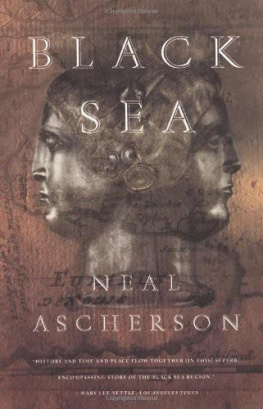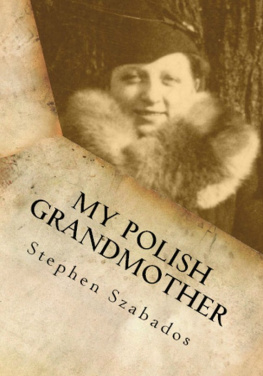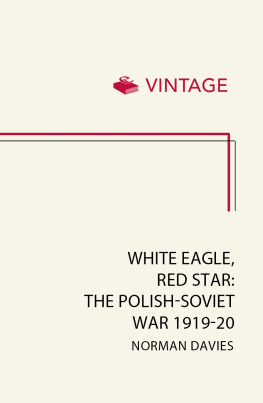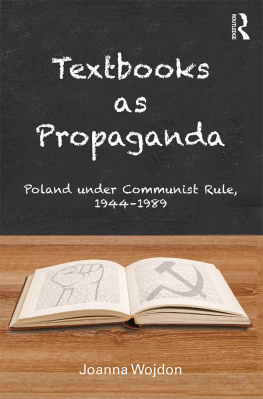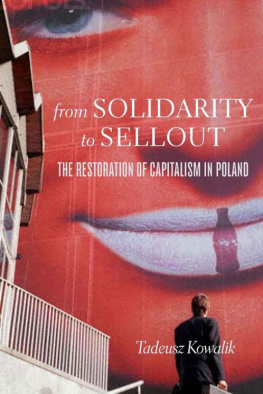The Polish August
Neal Ascnerson

This electronic edition published in 2011 by Bloomsbury Reader
Bloomsbury Reader is a division of Bloomsbury Publishing Plc, 50 Bedford Square, London WC1B 3DP
Copyright Neal Ascherson, 1981
The moral right of the author has been asserted
All rights reserved
You may not copy, distribute, transmit, reproduce or otherwise
make available this publication (or any part of it) in any form, or by any means
(including without limitation electronic, digital, optical, mechanical, photocopying,
printing, recording or otherwise), without the prior written permission of the
publisher. Any person who does any unauthorised act in relation to this publication
may be liable to criminal prosecution and civil claims for damages
ISBN: 9781448206391
eISBN: 9781448206032
Visit www.bloomsburyreader.com to find out more about our authors and their books
You will find extracts, author interviews, author events and you can sign up for
newsletters to be the first to hear about our latest releases and special offers
Contents
To Gustaw
who ordered me to write a book about Poland
Not far from Warsaw, a little off the main road to Pozna, there is a place called Arkadia. Built for the fancy of some early nineteenth-century count, it is a sort of park where, in a wood, there stand a number of dilapidated little monuments meant to evoke one or other of the romantic emotions. There is an attempt at Stonehenge, some fragmentary temples, a rocky grotto. And there is also an elaborate fountain, now dry, decorated with the stucco relief of a naked girl offering a drinking-cup to a dragon writhing intimately alongside her. It seems to be based on a fresco in the Villa of the Mysteries at Pompeii. Underneath is written: LEsprance Nourrit une Chimre, et la Vie scoule.
Since I first saw that fountain, more than twenty years ago on one of my early visits to Poland, the friends with whom I was young have grown middle-aged. Some nourished the thought that Polish Communism could, in spite of its past failures, find within itself the power to create a new synthesis of socialism and democracy which had never been seen in Europe. Others cradled the idea that the Soviet Union might one day be transformed or, less improbably, decide to withdraw behind its own frontiers. Meanwhile they raised children and, in their turn, now hear themselves explaining to sons and daughters as their parents had explained to them the difference between the real history of Poland and history taught at school. And life flowed away.
The events of 1980 in Poland were not, however, a chimera. The self-limiting revolution which began at Gdask in the Lenin Shipyard was real, and whatever price Poland may eventually have to pay for it, its intangible and moral achievements are permanent. If the democratic reform of the Polish United Workers Party and the appearance of the independent trade union Solidarity can be consolidated, this will also prove to have been the most important change in eastern Europe since the end of the Second World War. This book is an attempt to describe what took place in 1980, much of which I witnessed, to analyse some of its consequences and implications, and to ask why so many hopes had to be poured away in the preceding thirty-five years.
I have deliberately written about Poland as a European society, a member of the ancient continental family which is at present so superficially divided into alliances and communities, rather than as the problem member of the Communist bloc a bloodless kind of terminology. Especially in Poland, however, many people will disagree with judgements and versions of history in this book. Perhaps this is inevitable. The encounter with Poland corrodes most political assumptions, not because this is an exotic nation but because it presents a view of the squalid under-side of big concepts the side which rests on top of human beings. Bismarck, with his grand design for European peace, becomes the man who had thousands of Polish small boys caned for speaking their own language; Churchill and Stalin lost dignity in the hour of victory in wrangles over Polish rivers and villages they could not spell. Capitalism meant that the nations factories were owned by Germans and Frenchmen. Socialism, which in theory comes so much closer to the Polish sense of community and equality, has become a term so defiled by public squalor, private privilege and hypocrisy about the Soviet Union that it has become for the moment unrecognizable.
Ideological consistency, in Poland, is confined to leading articles in newspapers. The Poles are concerned to survive and Polish governments however extreme they appear are concerned not to do things to their own people that are unforgivable or irreparable. The results are often political systems whose structure mystifies the orderly mind of a foreigner, whether he is a Soviet official or an American professor. Edward Giereks rgime between 1970 and 1980, a Communist Politburo relying upon the Roman Catholic hierarchy and mortally afraid of the industrial proletariat, made all Europe stop and stare. When it fell down, there emerged a workers revolution which walked behind the crucifix and refused to take control of the means of production. Solidarity has been infinitely distressing to many left-wingers in the West. My hope is that this book, by explaining a little, will reduce that distress.
Many people have helped me with this book; none are responsible for its contents. I would like to thank especially the Observer, the Scotsman, the Spectator and the Guardian for sending me to Poland so often in the last twenty-five years, and the Ministry of Foreign Affairs not only for so many visas but for the patience of its officials under interview. Among those who gave me assistance and encouragement in the last two years, and to whom I will always be grateful, are: Christopher Bobinski, Eric Bourne, Michael Dobbs, Gustaw Gottesman, Krzystof Klinger, Henryk Krzecz-kowski, Oliver MacDonald, Karol and Irena Macuyski, Wojciech Sadurski, Marek Skwarnicki, Jadwiga Staniszkis, Ambassador Artur Stare-wicz, Boleslaw Sulik, Dessa Trevisan, Dr Jerzy Turowicz. I must also salute Belinda Magee for drawing the map, the British Library for Political and Economic Science for letting me work there, and especially Elisabeth Sifton of Viking for her phenomenal energy and sympathy as an editor. Finally, honour to the friends of 28 East Preston Street in Edinburgh, to Isabel Hilton, Lynda Myles, Tom Nairn and Ellen Galford, for whom what I write is written.
Chapter One
Introduction
Our Only Guarantee Is Ourselves
At five in the evening, on 16 December 1980, the sirens of Gdask began to sound. The Lenin Shipyard spoke first, and then the repair yards. From the dark city the factory whistles joined them, the voices of the docks, the locomotives in the railway yards, the buses in their depots, the boats at the yacht basin, the bass sirens of the ships alongside in the port or at their moorings in the roadstead, all combining in one interminable, groaning chord.
For minute after minute, a hundred and fifty thousand people stood outside the Lenin Shipyard gate in reverence, their hats in their hands. One after another, the sirens began to drawl down the scale into silence until the only sounds were the wail of tugs and fishing boats still lamenting somewhere in the darkness of the Bay of Hel, or at the outfall of the Dead Vistula. They too became quiet. Then for a time there was nothing at all to be heard. The sleet glittered through the floodlights and slanted past the triple spire of the new monument. At its base, where strike leaders, Catholic bishops, Communist officials, Polish generals and admirals stood shoulder to shoulder, a conductors baton twitched. Another huge, foreboding cry burst upward, as the orchestra moved into the first bars of Krzystof Pendereckis Lacrimosa chorale.


